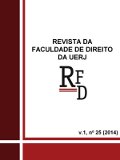AS ORIGENS DA TEORIA DO PODER CONSTITUINTE: UM RESGATE DA OBRA DE SIEYÈS E SUAS MÚLTIPLAS RELEITURAS PELA DOUTRINA PUBLICISTA CONTINENTAL / THE ORIGIN OF THE CONSTITUENT POWER THEORY: READING SIEYÈS’ WORKS AND ITS INTERPRETATIONS BY THE CONTINENTAL...
DOI:
https://doi.org/10.12957/rfd.2014.8032Palavras-chave:
Poder constituinte, Sieyès, Teoria da Constituição.Resumo
DOI:http://dx.doi.org/10.12957/10.12957/rfd.2014.8032
O trabalho se propõe a reconstruir o pensamento de Emmanuel-Joseph Sieyès acerca do poder constituinte, no contexto da revolução burguesa vivida na França no século XVIII. O objetivo central é identificar a origem histórica da teoria do poder constituinte, fixando os conceitos originais a fim de que se possa analisar criticamente as releituras que foram produzidas pela doutrina publicista continental nos séculos XIX e XX. Reconhece-se a figura de Sieyès como um importante pensador da filosofia política cuja contribuição foi determinante para a concepção moderna de constituição, bem como do seu processo democrático de construção a partir dos processo constituintes. O trabalho se insere num projeto amplo de pesquisa e rediscussão da teoria clássica do poder constituinte, a fim de que se possa avaliar até que o ponto a teoria tradicional pode dar conta das realidades constitucionais contemporâneas e das demandas sociais e políticas vividas na ocasião da mudança da ordem constitucional.
Downloads
Publicado
Como Citar
Edição
Seção
Licença
Direitos Autorais
oArtigos publicados na Revista da Faculdade de Direito da UERJ (RFD/UERJ)
Os Direitos autorais dos artigos publicados pertencem à Revista da Faculdade de Direito da UERJ (RFD/UERJ). É permitida a reprodução total ou parcial dos artigos desde que citada a fonte.
oReprodução parcial de outras publicações
Artigos submetidos que contiverem partes de texto extraídas de outras publicações deverão obedecer aos limites especificados para garantir originalidade do trabalho submetido. Plágio em todas as suas formas constitui comportamento antiético e é inaceitável.
Recomenda-se evitar a reprodução de tabelas e ilustrações, extraídas de outras publicações. O artigo que contiver reprodução de uma ou mais tabelas e/ou ilustrações de outras publicações só será encaminhado para análise se vier acompanhado de permissão escrita do detentor do direito autoral do trabalho original para a reprodução especificada na Revista da Faculdade de Direito da UERJ (RFD/UERJ). A permissão deve ser endereçada ao autor do trabalho submetido. Em nenhuma circunstância a Revista da Faculdade de Direito da UERJ (RFD/UERJ) e os autores dos trabalhos publicados nesta revista repassarão direitos assim obtidos.
·Os trabalhos não aceitos para a publicação serão devolvidos aos autores, se solicitado.
A Revista da Faculdade de Direito está licenciada com uma Licença Creative Commons Atribuição 4.0 Internacional.
Este trabalho está licenciado sob uma Licença Creative Commons 4.0, Atribuição-Sem Derivações.
Esta licença permite copiar e redistribuir o material em qualquer suporte ou format para qualquer fim, mesmo que comercial, desde de que citada a autoria original.











